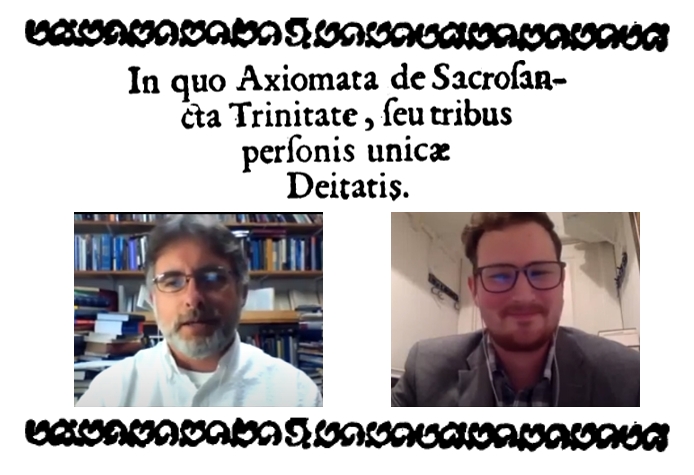
In this section –one sub-section of Axiom 14– Polanus focuses on a difficult task. He intends to show how to speak responsibly about a divine person in relation to the divine essence. What’s difficult about that is that a divine person just is the divine essence: the Father is God, and so on. There is no difference between the Father and the divine essence, in reality. But conceptually, we can think of the Father on the one hand, and the divine essence on the other, and then combine the two thoughts into the judgment that the Father is, or has, the divine essence. It’s admittedly an abstract thing to do, and we should be careful not to let ourselves get tricked into thinking that just because there are two nouns in the sentence “the Father is God,” that there are two things involved.
If you want to see where we are on the chart of Axiom 14, we’re following out this highlighted trail from left to right:

This line of thought terminates in the list of ten ways that we speak differently about a divine person and the divine essence. Having reached the end of that line, Polanus will go back in the next section to consider a divine person in relation to the other divine persons. And we will follow him.
But for today, here’s Ryan Hurd’s fresh, new, never-before-seen and not-yet-published-unless-you-count-this-blog-post translation of this section:
Take the person relatively, insofar as he has a relation either to the essence or to other persons. When one considers the person with respect to the essence, he is indeed the divine essence in actual reality, but still distinguished from it in our reason, on account of the relation which says something beyond the essence, as Thomas Aquinas says;[1] or the person is distinguished from the essence as a mode of a thing from the thing, or formally, as Ockham, Gabriel Biel, and their followers say, where “form” is equivalent to “mode.”
The differences between divine essence and person are as follows.
(1) Essence pertains to substance, while person pertains to relation.
(2) Essence is communicable, and person incommunicable.
(3) Essence, in accordance with its perfection, has the concept of being “common”; person, in accordance with its relation due to its opposition to other persons, has the concept of being “particular” (just as is one usually speaks of a divine person) who subsists in one common existence.
(4) Person includes origin in the Son and Holy Spirit, for the person of the Son is from the person of the Father, and the person of the Holy Spirit is from Father and Son. But essence lacks every origin—equally in the Son and Holy Spirit as in the Father.
(5) One speaks about the person what cannot be said properly of the divine essence in the abstract: e.g., the Father generates, but the divine essence does not generate; the Son is begotten, but the divine essence is not begotten; the Holy Spirit proceeds, but the divine essence does not proceed.
(6) Person is defined or described in one way, while in another way essence is described—one as the essence of the person and another as the formal definition of essence.
(7) One attributes “person” of Father, Son, or Holy Spirit not according to substance but properly in the relation or distinction being explained of the [υφισταμενων?]. But we predicate essence of Father, Son, or Holy Spirit in the unity being shown of the nature of the three.
(8) The essence is something undivided, but Father, Son, and Spirit are something divided.
(9) One person is [not] predicated of another; for the Father is not the Son, the Son is not the Father, and the Holy Spirit is not the Father or Son. But the divine essence is predicated of each person.
(10) Adjectives attributed to person and essence vary in the grammatical genus. Masculine adjectives added or subjected to the names of the persons or attributed to them signify the person: e.g., the Father is alius, the Son is alius, and the Holy Spirit is alius; or the Father is alius than the Son and Holy Spirit, because the person of the Father is alia, that of the Son is alia, and that of the Holy Spirit is alia. For this reason, John 5:32 says: “There is an alius who testifies of me.” Adjectives in the neuter denote essence—such as when we say, in the deity there is not aliud et aliud, because the essence of the Father is not alia, the essence of the Son is not alia, and the essence of the Holy Spirit is not alia, but one and the same. Thus, Christ says, “I and the Father are one” (John 10:30), because there is one and the same essence of Son and Father. The Son is that which the Father is; for each is God or belongs to that very essence. But the Son is not he who is the Father, for they are not one person.___________________________________
[1] Probably ST I:39, q 1.
And here’s the video in which Ryan and I discuss this section. It recorded, for reasons obscure to us, in Zoom’s speaker view rather than gallery view. Alas. Well, close-ups never killed anybody, I suppose.
Under point 7 above, Polanus drops in a Greek word, and it’s not entirely obvious to either of us what word it is. Not only can’t we figure out what word he would be likely to be using here, but we can’t quite read the terrible little Greek font:

Didn’t catch that? I said

A special no-prize will be sent to any alert viewer/reader who can advise us on this blobby blob of an important word.